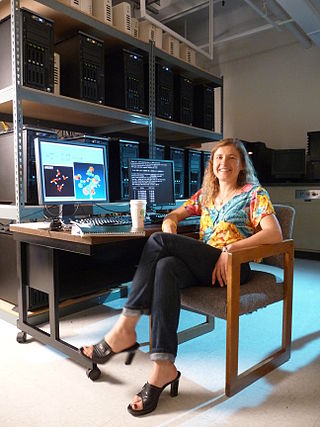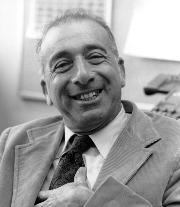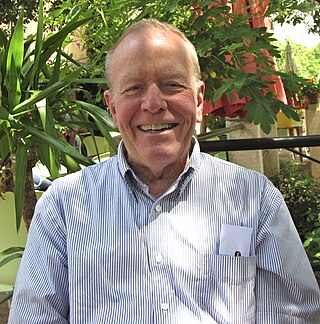
Kenneth Geddes "Ken" Wilson was an American theoretical physicist and a pioneer in using computers for studying particle physics. He was awarded the 1982 Nobel Prize in Physics for his work on phase transitions—illuminating the subtle essence of phenomena like melting ice and emerging magnetism. It was embodied in his fundamental work on the renormalization group.

Peter V. Coveney is a British chemist who is Professor of Physical Chemistry, Honorary Professor of Computer Science, and the Director of the Centre for Computational Science (CCS) and Associate Director of the Advanced Research Computing Centre at University College London (UCL). He is also a Professor of Applied High Performance Computing at University of Amsterdam (UvA) and Professor Adjunct at the Yale School of Medicine, Yale University. He is a Fellow of the Royal Academy of Engineering and Member of Academia Europaea. Coveney is active in a broad area of interdisciplinary research including condensed matter physics and chemistry, materials science, as well as life and medical sciences in all of which high performance computing plays a major role. The citation about Coveney on his election as a FREng says: Coveney "has made outstanding contributions across a wide range of scientific and engineering fields, including physics, chemistry, chemical engineering, materials, computer science, high performance computing and biomedicine, much of it harnessing the power of supercomputing to conduct original research at unprecedented space and time scales. He has shown outstanding leadership across these fields, manifested through running multiple initiatives and multi-partner interdisciplinary grants, in the UK, Europe and the US. His achievements at national and international level in advocacy and enablement are exceptional".

Denis James Evans, is an Australian scientist who is an Emeritus Professor at the Australian National University and Honorary Professor at The University of Queensland. He is widely recognised for his contributions to nonequilibrium thermodynamics and nonequilibrium statistical mechanics and the simulation of nonequilibrium fluids.
Michael Ellis Fisher was an English physicist, as well as chemist and mathematician, known for his many seminal contributions to statistical physics, including but not restricted to the theory of phase transitions and critical phenomena. He was the Horace White Professor of Chemistry, Physics, and Mathematics at Cornell University. Later he moved to the University of Maryland College of Computer, Mathematical, and Natural Sciences, where he was University System of Maryland Regents Professor, a Distinguished University Professor and Distinguished Scholar-Teacher.
The Boltzmann Medal is a prize awarded to physicists that obtain new results concerning statistical mechanics; it is named after the celebrated physicist Ludwig Boltzmann. The Boltzmann Medal is awarded once every three years by the Commission on Statistical Physics of the International Union of Pure and Applied Physics, during the STATPHYS conference.

Giorgio Parisi is an Italian theoretical physicist, whose research has focused on quantum field theory, statistical mechanics and complex systems. His best known contributions are the QCD evolution equations for parton densities, obtained with Guido Altarelli, known as the Altarelli–Parisi or DGLAP equations, the exact solution of the Sherrington–Kirkpatrick model of spin glasses, the Kardar–Parisi–Zhang equation describing dynamic scaling of growing interfaces, and the study of whirling flocks of birds. He was awarded the 2021 Nobel Prize in Physics jointly with Klaus Hasselmann and Syukuro Manabe for groundbreaking contributions to theory of complex systems, in particular "for the discovery of the interplay of disorder and fluctuations in physical systems from atomic to planetary scales".

Anna Igorevna Krylov is the USC Associates Chair in Natural Sciences and Professor of Chemistry at the University of Southern California (USC). Working in the field of theoretical and computational quantum chemistry, she is the inventor of the spin-flip method. Krylov is the president of Q-Chem, Inc. and an elected member of the International Academy of Quantum Molecular Science, the Academia Europaea, and the American Academy of Sciences and Letters.
The Widom insertion method is a statistical thermodynamic approach to the calculation of material and mixture properties. It is named for Benjamin Widom, who derived it in 1963. In general, there are two theoretical approaches to determining the statistical mechanical properties of materials. The first is the direct calculation of the overall partition function of the system, which directly yields the system free energy. The second approach, known as the Widom insertion method, instead derives from calculations centering on one molecule. The Widom insertion method directly yields the chemical potential of one component rather than the system free energy. This approach is most widely applied in molecular computer simulations but has also been applied in the development of analytical statistical mechanical models. The Widom insertion method can be understood as an application of the Jarzynski equality since it measures the excess free energy difference via the average work needed to perform, when changing the system from a state with N molecules to a state with N+1 molecules. Therefore it measures the excess chemical potential since , where .

Berni Julian Alder was a German-born American physicist specialized in statistical mechanics, and a pioneer of computational modelling of matter.
Ezechiel Godert David "Eddie" Cohen was a Dutch–American physicist and Professor Emeritus at The Rockefeller University. He is widely recognised for his contributions to statistical physics. In 2004 Cohen was awarded the Boltzmann Medal, jointly with Prof. H. Eugene Stanley. Cohen's citation read "For his fundamental contributions to nonequilibrium statistical mechanics, including the development of a theory of transport phenomena in dense gases, and the characterization of measures and fluctuations in nonequilibrium stationary states."
The Onsager Medal (Onsagermedaljen) is a scholastic presentation awarded to researchers in one or more subject areas of chemistry, physics or mathematics. The medal is awarded in memory of Lars Onsager, who received Nobel Prize in Chemistry in 1968. The medal, designed by Harald Wårvik, commemorates the efforts of a single individual as chosen by the Onsager committee at the Norwegian University of Science and Technology (NTNU). The professorship awardee is expected to spend 3–6 months working at NTNU. The lectureship awardee will give a lecture at the university.

Jack H. Freed is an American chemist known for his pioneering work in electron paramagnetic resonance spectroscopy. He is the Frank and Robert Laughlin Professor of Physical Chemistry, emeritus, at Cornell University in Ithaca, New York.
John Isaiah Brauman was an American chemist.

Julia Mary Yeomans is a British theoretical physicist active in the fields of soft condensed matter and biological physics. She has served as Professor of Physics at the University of Oxford since 2002.

James Bernhard Anderson was an American chemist and physicist. From 1995 to 2014 he was Evan Pugh Professor of Chemistry and Physics at the Pennsylvania State University. He specialized in Quantum Chemistry by Monte Carlo methods, molecular dynamics of reactive collisions, kinetics and mechanisms of gas phase reactions, and rare-event theory.
Robert Walter Zwanzig was an American theoretical physicist and chemist who made important contributions to the statistical mechanics of irreversible processes, protein folding, and the theory of liquids and gases.
Norman F. Carnahan is an American chemical engineer, a Fellow of The American Institute of Chemical Engineers. He is the Founding Chair of the Upstream Engineering and Flow Assurance (UE&FA) Forum of AIChE. From 2011 - 2019, he served as the AIChE member on the Board of Directors of The Offshore Technology Conference.

Bidyendu Mohan Deb is an Indian theoretical chemist, chemical physicist and a professor at the Indian Institute of Science Education and Research, Kolkata (IISER). he is known for his studies in theoretical chemistry and chemical physics. He is an elected fellow of the International Union of Pure and Applied Chemistry, The World Academy of Sciences, Indian National Science Academy and the Indian Academy of Sciences. The Council of Scientific and Industrial Research, the apex agency of the Government of India for scientific research, awarded him the Shanti Swarup Bhatnagar Prize for Science and Technology, one of the highest Indian science awards, in 1981, for his contributions to chemical sciences.

William Michael Gelbart is Distinguished Professor of Chemistry and Biochemistry at the University of California, Los Angeles, and a member of the California NanoSystems Institute and the UCLA Molecular Biology Institute. He obtained his Bachelor of Science degree from Harvard University in 1967, his Master's (1968) and PhD (1970) degrees from the University of Chicago, and did postdoctoral work at the University of Paris (1971) and the University of California, Berkeley (1972). After 30 years of research in theoretical physical chemistry, contributing notably to the fields of gas-phase photophysics, optical properties of simple liquids, and the statistical physics of complex fluids, he started a biophysics laboratory with Charles Knobler in 2002 to investigate the physical aspects of viral infectivity.
George Jackson,, , is a British professor of chemical physics in the Department of Chemical Engineering at Imperial College London. He is noted for developing molecular models that describe the thermodynamic properties of complex fluids; as one of the developers of statistical associating fluid theory (SAFT); and for his work in molecular systems engineering. His theoretical work has found a wide range of practical applications in industries such as gas extraction and emerging fields like carbon capture and storage.










